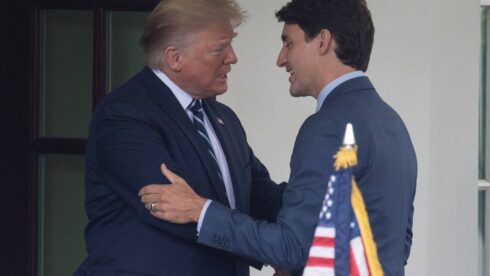Prime Minister Justin Trudeau arrived in Florida for a crucial meeting with President-elect Donald Trump at his Mar-a-Lago estate, following a threat from Trump to impose a 25% tariff on Canadian goods. This move comes as Canada aims to avert the potentially devastating economic consequences of the tariff, which could significantly impact the country’s trade relations with the United States. A source confirmed that Trudeau’s visit was not included on his public itinerary, and the two leaders are expected to have dinner together. This visit marks Trudeau as the first G7 leader to meet with Trump since the 2024 U.S. election, underscoring the importance of their diplomatic discussions.
Earlier in the week, Trudeau and Trump spoke over the phone after the latter announced his intention to impose the tariff upon taking office in January. While neither the prime minister’s office nor Trump’s team have officially commented on the visit, it is clear that the issue of trade is a central topic of concern for both leaders. Trudeau’s visit to Mar-a-Lago is seen as a critical step in navigating the fragile economic ties between the two countries, especially with the looming threat of tariffs that could disrupt trade flows.
Trudeau and Trump: A Complex Relationship
The relationship between Prime Minister Trudeau and President-elect Trump has often been fraught with tension. Despite some differences, the two countries successfully renegotiated a major trade deal during Trump’s first term, which Trudeau often highlights when speaking about their cooperation. However, the ongoing tariff threat has introduced a new layer of complexity to the bilateral relationship. Trudeau has expressed concerns about the negative consequences of such tariffs, not only for Canada but also for the U.S. economy. He emphasized that the imposition of tariffs would result in higher prices for American consumers, potentially harming the broader economic landscape on both sides of the border.
In a speech in Prince Edward Island on Friday, Trudeau reflected on the successful collaboration between the two nations, pointing out the job creation benefits for both Canada and the U.S. He acknowledged that while their relationship has had its challenges, he looks forward to engaging in “great” conversations with Trump. Trudeau’s diplomatic efforts aim to ease the tensions surrounding the tariff threat and reinforce the economic ties that have long existed between the two nations. The Florida visit highlights Trudeau’s commitment to managing this delicate relationship, which has significant economic implications for both countries.
Canada’s Strategy to Counter the Tariff Threat
The 25% tariff proposed by Trump could have far-reaching economic consequences, particularly for Canada, one of the U.S.’s largest trading partners. Approximately 75% of Canada’s exports are sent to the United States, with key industries such as automotive and oil and gas standing to suffer greatly if the tariff is implemented. In response to the looming threat, Trudeau has taken swift action to coordinate with Canadian provincial leaders on a unified approach to address the tariff issue. On Wednesday, he held an emergency meeting with provincial and territorial leaders, promising to present a united front—referred to as “Team Canada”—when engaging with the U.S. on this matter.
Trudeau has made it clear that the tariff would not only harm Canadian businesses but would also have a detrimental effect on American consumers. He argued that higher prices in the U.S. would ultimately undermine the country’s economic well-being, making the imposition of the tariff a lose-lose situation for both countries. Alongside Trudeau, Minister of Border Security Dominic LeBlanc accompanied the prime minister on the trip, further emphasizing Canada’s commitment to tackling the tariff threat head-on.
Uncertainty Surrounding Trump’s Tariff Plans
While Trump’s threat to impose tariffs on Canadian and Mexican goods has garnered significant attention, it remains unclear whether the incoming administration will follow through with this promise. Analysts have noted that Trump has previously used tariff threats as a negotiation tactic, and it is possible that this latest threat is part of a broader strategy to secure concessions from both Canada and Mexico on border security. In his phone call with Trump, Trudeau expressed his concern that Trump was serious about carrying out the tariff plan, but he also emphasized the need for continued dialogue between the two leaders to avoid economic harm.
In addition to the U.S.-Canada trade relationship, Trump has also threatened similar tariffs on Mexican goods, signaling that his position on border security will be a central issue for the incoming administration. As part of the broader trade and security discussions, Canadian officials are working closely with their American counterparts to enhance border security, even though apprehensions at the U.S.-Canada border remain relatively low compared to the southern border. The potential tariffs have cast a shadow over the U.S.-Canada relationship, and Canada’s leadership is focused on minimizing the negative impact of these proposed economic measures.














